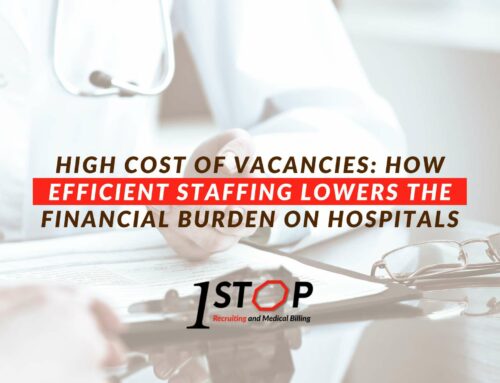Physician vs. Nurse: Key Considerations For Choosing The Right Healthcare Provider
When it comes to your healthcare journey, one of the most critical decisions you’ll face is choosing between a physician and a nurse to oversee your medical care. Each profession brings unique skills and expertise, making the decision-making process crucial for your well-being.
In this article, we’ll explore what should influence your choice with the help of a trusted Mesa Medical Staffing Agency. We’ll shed light on each role in healthcare and how their qualifications can impact the quality of your treatment.
Whether you’re a patient looking for the best care or a healthcare professional exploring career opportunities, this guide will illuminate the path ahead. So, let’s get started!

Key Differences Between Physician & Nurse In Education, Training & Responsibilities
It’s essential to recognize that physicians and nurses play different yet complementary roles. These roles are defined by their areas of expertise and their levels of training and responsibilities. Let’s take a closer look at each of them.
What Is A Doctor?
In the healthcare industry, a doctor is a licensed medical professional who has completed extensive education, training, and clinical experience to diagnose, treat, and care for patients. Doctors are also often referred to as physicians, and they play a central role in the medical field.
Physicians have the authority to prescribe medications, order diagnostic tests, and perform medical procedures, making them essential for complex diagnoses and treatments.
Doctors can have various specialties, such as family medicine, internal medicine, surgery, psychiatry, and more. The specialty depends on their interests, aptitude, and the specific healthcare needs they aim to address.
Depending on your needs, a medical staffing agency can help you choose the best physician.
What Is A Nurse?
Nurses are highly skilled healthcare professionals who provide direct patient care and support. They can have various levels of education, from licensed practical nurses (LPNs) to registered nurses (RNs) and nurse practitioners (NPs).
Some nurses pursue specialized training and certification in areas like pediatric nursing, critical care, obstetrics, mental health, and nurse anesthesia. Advanced Practice Registered Nurses (APRNs) can diagnose and treat medical conditions, prescribe medications, and provide advanced care within their specialty.
They’re highly skilled professionals who contribute significantly to the healthcare system’s overall quality and effectiveness. They work tirelessly to promote wellness, alleviate suffering, and improve the overall health outcomes of individuals and communities.
Don’t forget that a medical staffing agency can also help you find the right nurse for your healthcare facility.
A Comprehensive Guide To Understanding Their Roles, Responsibilities & Differences
Physicians and nurses are vital components of the healthcare system, but they have distinct roles, responsibilities, and training. Let’s outline their differences and similarities:
Similarities
- Patient Care: Both provide quality patient care, focusing on patient well-being, comfort, and recovery.
- Collaboration: Both professionals work collaboratively within healthcare teams. They communicate patient information, collaborate on treatment plans, and contribute their expertise to optimize patient outcomes.
- Advocacy: Physicians and nurses advocate for their patients, ensuring their needs are met, and their rights are protected within the healthcare system.
- Health Promotion: Both physicians and nurses are involved in health promotion and disease prevention, educating patients and the community about maintaining a healthy lifestyle.
- Continuing Education: Both professions require ongoing learning and professional development to stay current with medical advancements and best practices.
Differences
Education and Training:
- Physicians: Physicians undergo extensive education, typically earning a Doctor of Medicine (MD) or Doctor of Osteopathic Medicine (DO) degree after completing a bachelor’s degree.
- Nurses: Nurses can have various levels of education, including Licensed Practical Nurses (LPNs), Registered Nurses (RNs), and Advanced Practice Registered Nurses (APRNs). The length and depth of their training vary, so we recommend consulting a medical staffing agency to get help when choosing the right nurse for your healthcare facility.
Scope of Practice:
- Physicians: Physicians are licensed to diagnose medical conditions, prescribe medications, order tests and treatments, and perform medical procedures.
- Nurses: Nurses provide direct patient care, administer medications, monitor vital signs, and assist with medical procedures. They generally work under the direction of physicians.
Specialization:
- Physicians: Physicians often specialize in specific areas of medicine, such as cardiology, surgery, pediatrics, or internal medicine.
- Nurses: Some nurses pursue specialization through certification in areas like critical care, obstetrics, psychiatric nursing, or nurse anesthesia. Advanced Practice Registered Nurses (APRNs) can have independent practices in certain states and can diagnose and treat medical conditions.
Treatment Planning:
- Physicians: Physicians typically develop comprehensive treatment plans, make medical decisions, and oversee the overall care of patients.
- Nurses: Nurses implement the treatment plans created by physicians, providing hands-on care and monitoring patient progress.
Factors To Consider When Choosing Between a Physician & a Nurse For Your Healthcare Needs
Many factors can influence the choice between consulting a physician or a nurse for your healthcare needs. Understanding these factors is essential in making an informed decision that aligns with your health requirements and preferences.
We suggest talking to a trusted medical staffing agency to get more help, but you can be well-informed with the following considerations:
Nature & Complexity Of The Health Issue
For routine or less complex health concerns, a nurse may be enough to provide care, answer questions, and offer guidance.
For complex medical conditions, a physician’s expertise is often necessary due to their ability to diagnose, prescribe medications, and perform procedures.
Primary Care vs. Specialized Care
For general health check-ups, preventive care, or minor illnesses, a primary care physician (PCP) or nurse practitioner (NP) can be a good choice.
For specific medical conditions, consulting a specialist physician who focuses on that area of medicine may be the best.
Access & Availability
Consider the availability of healthcare professionals in the area. In some regions, nurse practitioners may be more accessible than physicians.
Personal Preferences & Comfort
Personal comfort with the healthcare provider is also crucial. Some people may prefer a nurturing and empathetic approach, while others may feel more at ease with a physician’s diagnosis.
Insurance Coverage & Costs
Insurance plans and financial considerations can also impact the choice. Some insurance plans may require referrals from primary care providers (either physicians or nurse practitioners) for specialist consultations.
One Stop Recruiting: Your Partner In Finding The Right Healthcare Professional For Your Needs
If you’re seeking the right healthcare professional for your specific needs, we recommend considering the services of a reputable medical staffing agency.
Here at One Stop Recruiting, we specialize in connecting individuals with the most qualified healthcare professionals. Our agency can help match you with the right physician, nurse practitioner, or nurse to address your healthcare requirements. Contact us today!
Email: info@1stoprecruiting.com
Website: https://www.1stoprecruiting.com/
ARIZONA
8743 E Pecos Rd #127,
Mesa, AZ 85212
Phone: (480) 739-9207
TEXAS
6114 Ben Rd
Sachse, TX 75048
Phone: (972) 885-3418
CALIFORNIA
918 N Evergreen Ave,
Los Angeles, CA 90033
Phone: (323) 431-5787
NEW YORK
245-77 62nd Ave,
Queens, NY 11362
Phone: (646) 906-9772
FLORIDA
3361 Hendricks Ave,
Jacksonville, FL 32207
Phone: (904) 944-7500
COLORADO
1776 Curtis Street Apt 1912,
Denver, CO 80202
Phone: (720) 734-6600
VEGAS
9620 W Port Orange Ln,
Las Vegas, NV 89134
Phone: (702) 489-0708
MICHIGAN
2614 Joseph Campau Ave,
Detroit, MI 48207
Phone: (313) 306-8696
PENNSYLVANIA
2047 N Howard St,
Philadelphia, PA 19122
Phone: (215) 798-9282
INDIANA
621 S Taft Ave,
Indianapolis, IN 46241
Phone: (317) 779-3237
NEW HAMPSHIRE
1641 Lafayette Rd,
Portsmouth, NH 03801
Phone: (603) 931-4744
GEORGIA
648 Cleburne Terrace NE,
Atlanta, GA 30306
Phone: (404) 620-3523
ILLINOIS
6124 S Ingleside Ave Apt 3E
Chicago, IL 60637
Phone: (773) 839-3240
OHIO
245-77 62nd Ave,
Columbus, OH 43204
Phone: (614) 502-3782
TENNESSEE
354 Flushing Drive
Nashville, TN 37211
Phone: (629) 258-6403






